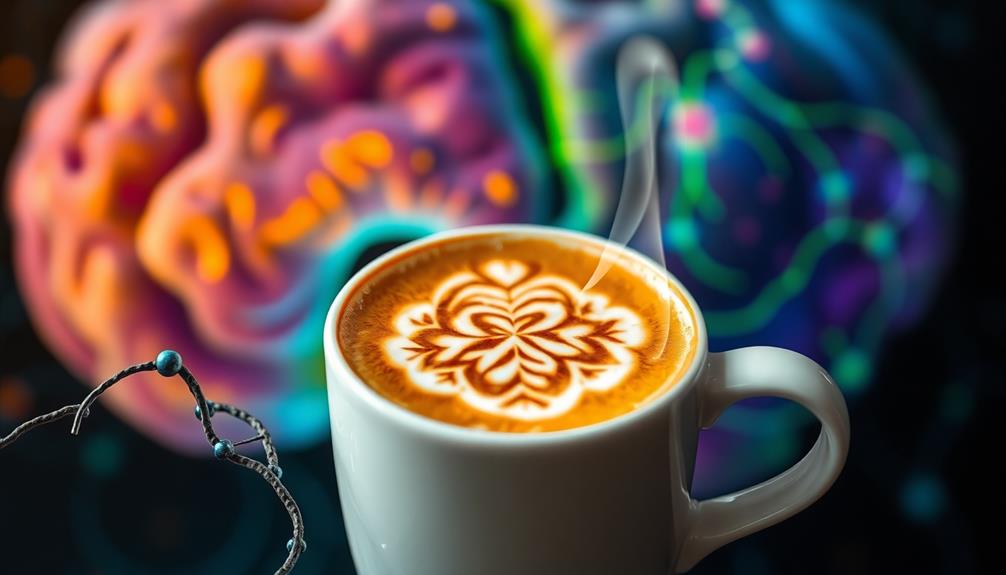Genetics are a significant factor in your love for coffee. Research indicates that 36-58% of caffeine consumption is determined by genetics, indicating a strong familial link. Specific genes such as CYP1A1 and CYP1A2 impact how your body processes caffeine, influencing your reaction to coffee. Interestingly, these genetic indicators also connect coffee habits to other substance use, like alcohol and nicotine. Therefore, if you’re constantly craving another cup of coffee, it may be more than just a routine. Exploring this genetic correlation could unearth surprising revelations about your caffeine addiction and its wider consequences.
Key Takeaways
- Genetic factors contribute significantly to caffeine consumption traits, with heritability estimates ranging from 36-58%.
- Specific genetic variants in CYP1A1 and CYP1A2 genes influence individual responses and metabolism of caffeine.
- Research shows a correlation between genetic predispositions for coffee consumption and other addictive behaviors, like smoking and alcohol use.
- Environmental influences, such as culture and personal health history, interact with genetics to shape coffee habits and consumption patterns.
- Understanding shared genetic factors may help develop personalized recommendations for coffee intake and address potential addiction issues.
Genetic Factors Influencing Coffee Consumption

When it comes to coffee consumption, genetic factors play an essential role in determining how much you might enjoy that morning cup. Research shows that caffeine consumption traits are estimated to be 36-58% heritable, suggesting your genes greatly influence your coffee intake. Specific variants associated with caffeine metabolism, particularly within the CYP1A1 and CYP1A2 genes, are fundamental in how your body processes caffeine.
This means that if you find yourself sensitive to caffeine or needing that extra shot of espresso to feel awake, your genetics might be at play. Notably, just as traditional beverages like ouzo are deeply rooted in culture, your affinity for coffee can also reflect a blend of inherited traits and personal habits.
Moreover, studies indicate that these genetic predispositions to coffee consumption also correlate with other substance use traits, such as smoking and alcohol consumption. This shared genetic background suggests a complex interplay between your genes and habits.
Curiously, research involving over 120,000 coffee drinkers identified six genetic markers linked to caffeine responsiveness, highlighting the intricate relationship between genetics and your coffee habits.
It's also important to take into account environmental factors; differences between populations, like those in the U.S. and U.K., show that your surroundings can further influence your coffee consumption patterns. For instance, climate variations and cultural practices can affect the accessibility and preference for certain coffee types in different regions. Additionally, the effects of altitude on coffee are also a critical consideration, as higher altitudes often produce beans with richer flavors due to slower growing conditions. These environmental influences collectively shape both the availability of coffee and individual consumption habits.
Health Effects of Coffee Intake

Moderate coffee intake, typically defined as 1-2 cups per day, can be beneficial for your health. Research shows that this level of coffee consumption is associated with protective health benefits, including a reduced risk of liver disease and cardiovascular issues. The polyphenols in coffee may also enhance gut microbiome diversity, promoting improved overall health and metabolic function.
Notably, just like farm-to-table cooking emphasizes the importance of fresh, seasonal ingredients, your unique genetics also play a significant role in how your body processes coffee.
However, it's important to recognize the potential cognitive risks tied to excessive intake. Drinking six or more cups daily has been linked to a 53% increased risk of dementia and smaller brain volume. Individual responses to coffee are influenced by genetics, particularly genetic variants that affect caffeine metabolism. This means that what works for someone else mightn't be suitable for you.
While moderate coffee intake may offer cognitive benefits, excessive consumption can impair cognitive function and brain health. As such, it's vital to personalize your coffee habits based on your unique genetic makeup.
Environmental Influences on Coffee Habits

When you think about your coffee habits, consider how cultural practices and personal health history shape your choices.
For instance, just as certain spices enhance the flavor of dishes like Mushroom Masala, the way you brew and flavor your coffee can reflect the culinary influences of your background.
Your lifestyle and environment also play a big role in whether you enjoy a morning brew with sugar or prefer it black.
Understanding these influences can help you see how your coffee consumption fits into a bigger picture.
Cultural Drinking Practices
Cultural drinking practices around coffee reveal how deeply environmental influences shape habits and preferences. Your coffee consumption isn't just about genetics; it's also molded by the cultural norms and traditions of your surroundings.
For instance, how you enjoy coffee may be influenced by local ingredients, much like how Brazilian cuisine incorporates diverse flavors, such as the use of seafood. These environmental factors play a significant role in how you enjoy your brew.
Consider how your drinking habits may vary based on:
- The types of coffee available in your region
- The social settings where you drink coffee
- Whether you indulge in sugar or cream
- The influence of your lifestyle and diet
In places like the U.S. and U.K., studies show marked differences in coffee preferences, underscoring the impact of cultural context. Your choices in coffee can affect your health outcomes, illustrating that environment interacts with your genetics.
For instance, how you prepare and consume coffee—be it a strong espresso or a milky latte—can reflect broader traditions and social interactions. This interplay between your lifestyle and cultural background ultimately shapes your coffee preferences, making every cup a reflection of where you come from.
Personal Health History
Your personal health history plays an essential role in shaping your coffee habits, intertwining with both genetic factors and environmental influences. Genetics contributes considerably to your coffee consumption, accounting for 36-58% of caffeine consumption traits. Depending on your genetic variants, you may experience different levels of caffeine sensitivity, which directly affects your comfort with drinking coffee.
Environmental factors also play an important role. For example, cultural norms and lifestyle choices can modify how your genetics influence your coffee habits, leading to different consumption patterns. Here's a quick overview of how personal health history and environmental factors shape your coffee experience:
| Factor | Influence on Coffee Consumption |
|---|---|
| Genetic Variants | Affects caffeine sensitivity |
| Environmental Factors | Alters consumption habits |
| Contextual Choices | Impacts health outcomes (e.g., sugar) |
Considering these influences, it's wise to consult with healthcare providers for personalized guidance, especially if you have specific health conditions. This way, you can make informed choices regarding your coffee consumption that align with your lifestyle and health goals.
Lifestyle and Environment
Amidst the interplay of genetics and lifestyle, environmental factors greatly shape your coffee habits. Your coffee consumption patterns are influenced by the context in which you drink, including the cultural variations that dictate how you enjoy your brew. For instance, you might prefer your coffee black, while others in different regions might add sugar or cream, all of which can affect health outcomes.
Additionally, just as culinary traditions vary around the world, coffee drinking practices also reflect global culinary experiences that can influence flavor preferences and preparation methods.
Consider these aspects of your environment:
- Cultural variations in coffee drinking practices
- Social contexts that encourage coffee gatherings
- Lifestyle choices that dictate your daily routine
- Genetic predispositions that interact with environmental factors
These elements combine to create unique individual habits. While genetic factors can predispose you to certain coffee preferences, the surrounding environment often amplifies or suppresses those tendencies.
The differences in coffee consumption between U.S. and U.K. populations highlight just how much your surroundings can dictate your habits. As researchers explore deeper, understanding how social and environmental contexts interact with genetic factors will pave the way for more personalized insights into coffee addiction and consumption.
Links to Other Substance Use

Many studies suggest a captivating connection between coffee consumption and other substance use, indicating that genetics might play a significant role in these behaviors.
Research shows that certain genetic variants linked to coffee drinkers also correlate with traits associated with smoking initiation and other addictive behaviors. This points to a genetic predisposition that could make you more likely to engage in multiple substance use habits. Notably, just like the rich and bold flavors found in dishes such as Red-Braised Pork Belly, studies have shown that the complexity of these genetic traits can lead to a diverse range of consumption habits.
Data from large-scale studies like 23andMe and UK Biobank reveal positive associations between coffee consumption and substance use, highlighting shared genetic factors that influence these patterns.
If you've noticed a tendency to enjoy both coffee and cigarettes, it may not just be a coincidence. The findings imply that individuals who are genetically predisposed to higher coffee intake could also be more inclined to experiment with alcohol and nicotine.
As ongoing research investigates deeper into these complex relationships, understanding these shared genetic factors becomes essential.
While causation hasn't been firmly established, recognizing these connections can provide valuable insights into the interplay between coffee and other addictive behaviors in your life.
Cognitive Function and Caffeine

Caffeine can play an essential role in your brain health, potentially protecting against cognitive decline.
In addition to its cognitive benefits, many people enjoy caffeine alongside classic American comfort foods, such as loaded baked potatoes, enhancing their dining experience.
However, if you suddenly cut back on your coffee intake, you might experience withdrawal symptoms that could impact your focus and mood.
Understanding this balance is key to optimizing your cognitive function while enjoying your favorite brew.
Caffeine and Brain Health
The impact of caffeine on brain health is a captivating area of study, revealing both benefits and potential drawbacks. While moderate coffee consumption can offer significant health benefits, such as a lower risk of cognitive decline and dementia, it's vital to reflect on how individual responses vary due to genetic variations.
Notably, just as Indonesian desserts like Kue Putu provide a delightful balance of flavors, understanding your own caffeine response can lead to a more harmonious relationship with coffee.
Here are some key points to keep in mind:
- Caffeine can temporarily enhance attention, especially in sleep-deprived individuals.
- Polyphenols in coffee improve cognitive function and support brain health during stress.
- Excessive caffeine intake may diminish attentional performance and brain plasticity.
- Chronic high caffeine consumption could worsen brain changes linked to sleep deprivation.
Understanding these nuances helps you make informed decisions about your coffee consumption.
By recognizing your body's unique response to caffeine, you can enjoy the potential cognitive benefits while minimizing risks.
Remember, moderation is key; too much caffeine can lead to cognitive decline and negatively impact your overall brain health.
Withdrawal Symptoms Impact
Regular coffee drinkers often face significant cognitive challenges when they stop consuming caffeine. Withdrawal symptoms can severely impact your cognitive function, leading to reduced attentional performance.
Curiously, just like Southern comfort foods such as squash casserole, which provide a comforting boost during family gatherings, the brain's temporary boost from caffeine fades when you cut back on your intake. Cognitive deficits can emerge, making it hard to focus or think clearly.
Curiously, the psychological interplay of perceived caffeine also plays a role. Studies show that participants who believed they consumed caffeine reported a lesser degree of withdrawal symptoms compared to those told they'd decaf. This suggests that your mindset about caffeine consumption can shape how you experience caffeine withdrawal.
In fact, the Caffeine Withdrawal Symptom Questionnaire (CWSQ) indicated a notable mean reduction of 14.6 points in withdrawal symptoms among those who thought they ingested caffeine. This highlights how much your perception can influence cognitive performance during withdrawal.
Ultimately, while caffeine can enhance cognitive function in the short term, excessive withdrawal can lead to significant setbacks. Understanding these effects can help you navigate your caffeine consumption more mindfully, ensuring you maintain peak cognitive performance.
Future Directions in Coffee Research

Exploring the intricate relationship between genetics and coffee consumption, future research is set to investigate deeper into how genetic predispositions interact with environmental factors.
Just as diverse culinary traditions like Muamba De Galinha in Angola reflect varying cultural influences, significant discrepancies in coffee consumption patterns between diverse populations highlight the need for a more thorough understanding.
Researchers aim to:
- Conduct diverse population studies to replicate findings on genetic influences and their long-term effects on brain plasticity.
- Investigate the psychological impacts of genetic information on coffee consumption behaviors, particularly focusing on nocebo effects related to caffeine sensitivity.
- Explore the shared biology between coffee consumption and other addictive behaviors, like alcohol and nicotine use.
- Develop personalized dietary recommendations based on genetic insights, helping you make informed choices about your coffee habits.
As these studies unfold, they may reveal how your genetic makeup influences your coffee consumption and its potential health outcomes.
Understanding these connections could empower you to navigate your relationship with caffeine more effectively, considering both your genetic predispositions and the environmental factors at play.
The future of coffee research promises exciting insights into the intricate dance between genetics and our daily cup of joe.
Frequently Asked Questions
Is Coffee Intake Linked to DNA?
Yes, coffee intake is linked to DNA. Your genetic makeup influences how you metabolize caffeine, affecting your consumption levels. Studies show specific genetic variants can determine your coffee-drinking habits and preferences.
Can Genetic Variants Influence Coffee Consumption Habits?
Yes, genetic variants can influence your coffee consumption habits. They shape your caffeine metabolism, determine your preference for caffeinated versus decaffeinated options, and ultimately affect how much coffee you enjoy daily.
Why Do People Become Addicted to Caffeine?
You become addicted to caffeine mainly because it stimulates your brain's reward system, creating pleasurable feelings. As you consume more, your body adapts, increasing your tolerance and leading to cravings and withdrawal symptoms when you try to quit.
What Is the Genetic Mutation in Caffeine?
Imagine a race, where some sprint effortlessly while others lag behind. In caffeine's world, genetic mutations, especially in CYP1A1 and CYP1A2, determine your speed in metabolizing caffeine, shaping your coffee experience and sensitivity.
Conclusion
In summary, understanding the surprising link between genetics and coffee addiction opens a fascinating door to how our bodies respond to caffeine. Just like a well-tuned instrument, each person's genetic makeup plays a unique melody in their coffee habits. As researchers explore deeper, they'll uncover more about the health effects of coffee and its connections to other substances. So, whether you're a casual sipper or a dedicated brew master, your genes might just have a say in your coffee journey.









